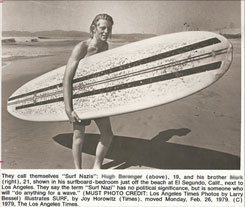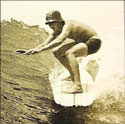Surf Nazi | Surf Nazi History (original) (raw)
 The term "surf nazi" has been in use since the fifties to describe someone who was unconditionally devoted to surfing. It was around this time that some surfers, particularly in the Southern California area, became less concerned with the values of mainstream society and more focused on surfing. They cared less about things like getting a good job and making a lot of money, and more about getting to the beach and riding waves. As Greg Noll put it, "For the first time ever, they had a group of guys that didn't give a rat's ass, dropping out of the basketball team or the football team and just giving the whole thing the finger going 'I don't give a shit about that, I wanna go surfing'". It was this same attitude and devotion to riding waves from which the term "surf nazi" was born.
The term "surf nazi" has been in use since the fifties to describe someone who was unconditionally devoted to surfing. It was around this time that some surfers, particularly in the Southern California area, became less concerned with the values of mainstream society and more focused on surfing. They cared less about things like getting a good job and making a lot of money, and more about getting to the beach and riding waves. As Greg Noll put it, "For the first time ever, they had a group of guys that didn't give a rat's ass, dropping out of the basketball team or the football team and just giving the whole thing the finger going 'I don't give a shit about that, I wanna go surfing'". It was this same attitude and devotion to riding waves from which the term "surf nazi" was born.
 After World War II, baby boomers all over southern California were picking up surfing. The introduction of balsa wood and fiberglass made surfboards much lighter and easier to carry. This paved the way for the next generation. As these surfers spent more time at the beach and less time in other social activities, they began to be viewed as beach bums and anti-social punks. In the early sixties, magazines like Time started associating surfers with bikers, drug addicts and gangs. As a result, some surfers began using nazi symbols as a sign of rebellion against mainstream society. Surfers like Miki Dora would put swastikas on their boards and wear iron crosses that were brought back from the war. Swastikas were painted on the wall in Malibu and the Windansea Pump House. The point was to piss people off, not to condone nazism. The symbols became a sign of surfing's hardcore subculture.
After World War II, baby boomers all over southern California were picking up surfing. The introduction of balsa wood and fiberglass made surfboards much lighter and easier to carry. This paved the way for the next generation. As these surfers spent more time at the beach and less time in other social activities, they began to be viewed as beach bums and anti-social punks. In the early sixties, magazines like Time started associating surfers with bikers, drug addicts and gangs. As a result, some surfers began using nazi symbols as a sign of rebellion against mainstream society. Surfers like Miki Dora would put swastikas on their boards and wear iron crosses that were brought back from the war. Swastikas were painted on the wall in Malibu and the Windansea Pump House. The point was to piss people off, not to condone nazism. The symbols became a sign of surfing's hardcore subculture.
 By the mid sixties, surfing's popularity was rapidly growing. The media was quick to jump on the bandwagon, and a toilet-full of cheesy "beach party" movies were being pumped out of the bowels of Hollywood like explosive diarrhea. More sewage was added compliments of the music industry, and "surf music" record sales were at an all-time high. Everyone had a surfboard, whether they knew how to ride it or not. The once uncrowded line-ups were now packed with kooks. Fights started breaking out over waves and territory. By the time the seventies rolled around, the term "surf nazi" took on a new meaning: an aggressive, territorial surfer.
By the mid sixties, surfing's popularity was rapidly growing. The media was quick to jump on the bandwagon, and a toilet-full of cheesy "beach party" movies were being pumped out of the bowels of Hollywood like explosive diarrhea. More sewage was added compliments of the music industry, and "surf music" record sales were at an all-time high. Everyone had a surfboard, whether they knew how to ride it or not. The once uncrowded line-ups were now packed with kooks. Fights started breaking out over waves and territory. By the time the seventies rolled around, the term "surf nazi" took on a new meaning: an aggressive, territorial surfer.
Whether territorial or not, Surf Nazis remain driven by their blinding passion and devotion to surfing.